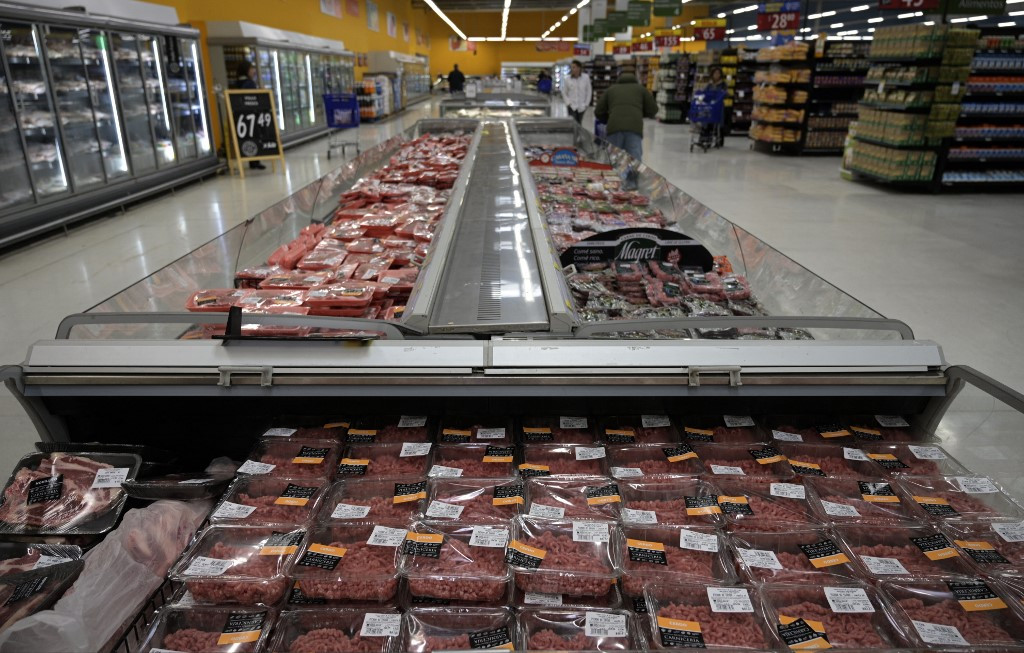Popular Reads
Top Results
Can't find what you're looking for?
View all search resultsPopular Reads
Top Results
Can't find what you're looking for?
View all search resultsArgentina suspends beef exports for 30 days
"As a consequence of the sustained increase of the price of beef on the domestic market, the government decided to implement a set of measures aimed at regulating the sector, restricting speculative practices and avoiding tax evasion in foreign trade. During the implementation of these measures, beef exports are limited for 30 days," a statement from the presidency said.
Change text size
Gift Premium Articles
to Anyone
 Minced beef packages are displayed for sale at a supermarket in Buenos Aires on August 15, 2019. Argentine President Mauricio Macri on Thursday reinforced his battery of relief measures in order to face an expected rise of inflation, by eliminating the sales tax on some food products until the end of year, following a crushing defeat in party primaries over the weekend.
(AFP/Juan Mabromata)
Minced beef packages are displayed for sale at a supermarket in Buenos Aires on August 15, 2019. Argentine President Mauricio Macri on Thursday reinforced his battery of relief measures in order to face an expected rise of inflation, by eliminating the sales tax on some food products until the end of year, following a crushing defeat in party primaries over the weekend.
(AFP/Juan Mabromata)
A
rgentina, a major exporter of beef in the world with some 819,000 tons sent abroad in 2020, suspended foreign sales for 30 days to combat price increases on the domestic market, the government said in a statement Monday.
"As a consequence of the sustained increase of the price of beef on the domestic market, the government decided to implement a set of measures aimed at regulating the sector, restricting speculative practices and avoiding tax evasion in foreign trade. During the implementation of these measures, beef exports are limited for 30 days," a statement from the presidency said.
Exceptions will be allowed for foreign exports already in progress.
Center-left President Alberto Fernandez told beef industry representatives of the decision during a meeting at the presidential mansion Casa Rosada.
In 2020, Argentina exported $3.37 billion of beef and cow leather -- a 16.5 percent drop compared in 2019 -- primarily to China, Germany and Israel, according to state statistics agency Indec.
Agricultural exports make up a majority of foreign spending in the country.
In an interview Sunday evening as he returned to Argentina from a trip to Europe, Fernandez had said he was "worried" about the increase in prices, especially of food.
"It worries me a lot, because it is inexplicable, there is really no reason, other than the increase in consumption, to explain the increases that we saw in March and April," he told news channel C5N.
Fernandez said he "celebrates" that Argentina exports beef, but regretted that "Argentines are made to pay the prices they are made to pay for meat."
He complained that only 8,000 tons of the 200,000 tons of beef that are eaten in Argentina per month are subsidized for consumers domestically, an amount he called "crumbs."
Sustained inflation
As of 2021, Argentines consume an annual average of 49.2 kilograms (108 pounds) of beef per person, compared with the 2009 peak of 69.3 kilograms on average, according to the Chamber of Meat Industry and Trade.
Beef industry groups pushed back against the government announcement.
"We are going to join together immediately to totally reject this disastrous measure," rancher Daniel Peregrina, president of the industry body the Argentina Rural Society, said Monday night.
"The damage caused by the measure will decrease the price of meat, making prices rise as has happened in the past," Peregrina said.
And on Twitter, the Argentina Rural Confederation also rejected the government's plan.
"The closure of meat exports is an error," the organization posted. "A step back for the development and growth of ranching. We are on our way to a trading halt."
Argentina has one of the most elevated consumer price indices in the world, as inflation hit 4.1 percent in April, with a total increase of 17.6 percent in the first four months of this year, according to Indec.
Such sustained incremental inflation reinforces the concern that it will be difficult for the government to cap this year's total inflation at 29 percent, which is the target that has been laid out in budget legislation.
The cost of living has increased 46.3 percent in the last 12 months, according to Indec.
In an effort to fight the effects of a long coronavirus lockdown, the government launched an economic aid program that included large monetary payouts.
Argentina is navigating its third year of recession, worsened by the Covid-19 pandemic which led to a 9.9 percent drop in GDP in 2020.









